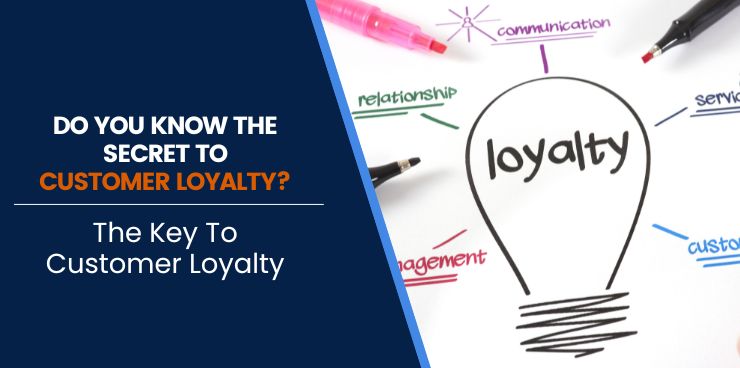Ask any entrepreneur you know what their primary goal is after rendering a service. Nine out of 10 times they’ll answer the same thing: customer satisfaction.
Sadly, business owners who only see satisfaction as the end-point of sale are missing the big picture. Why? Because there is something greater than satisfaction – it’s customer loyalty.
Customer loyalty eats customer satisfaction for breakfast.
Unlike merely satisfied buyers, a loyal customer base can lead to repeat purchases and positive word-of-mouth marketing. These aspects ultimately drive profits and solidify a strong brand image.
Among the thought leaders in sales, only Jeffrey Gitomer speaks boldly on customer loyalty. In his book, “Customer Satisfaction is WORTHLESS: Customer Loyalty is Priceless” he outlines 13 tips for building a loyal clientele. At the heart of customer loyalty is excellent, unrivaled and unequivocal customer service.
If you want to refine your customer service experience, you’ll need all the tips you can get. Wizard of Sales® is here to bring you the best advice straight from Jeffrey Gitomer’s book to help you out. Keep reading and discover how to perfect your customer service.
 Customer Loyalty Definition
Customer Loyalty Definition
There is a direct correlation between customer service and customer loyalty. The more refined and client-oriented relational experience is, the stronger your customer loyalty becomes. The tipping point of customer loyalty is how you treat your customers.
Okay, okay, I get you, but should I only focus on customer service then?
Of course not. Customer loyalty is a holistic idea. It is the summation of high-quality products, world-class services and excellent customer service. Jeffrey Gitomer wrote his book under the impression that your products and services are already exceptional. In that case, customer service will be the only element making the difference between satisfaction and loyalty.
After all, if your products and services are far from noteworthy, then why are you even in business?
Now, before we proceed, let’s first define what customer loyalty means.
In a nutshell, it is the devotion and allegiance of your customers toward your brand. They consistently choose you over competitors and actively promote your business to others. In today’s competitive market, having a strong base of loyal customers is crucial for long-term success.
On the other hand, customer satisfaction means you please customers with your solutions but you don’t have their unwavering support. They are prone to entertain offers from your competitors. Moreover, they won’t go out of their way to recommend you to others.
Mere customer satisfaction happens when your solutions are commendable, but your customer service is underwhelming.
Creating a positive customer service experience is key to cultivating loyalty among customers. If you’re looking for an expert to help you perfect your customer service process, look no further. Wizard of Sales® has been actively involved in refining the culture of many residential home service businesses. Book a call to learn how we can do the same with your business.
Gitomer’s Forbidden Phrases
Jeffrey Gitomer has always been known for his irreverent wit and wisdom in his books and keynotes. He didn’t fail to display the same in his book “Customer Satisfaction is WORTHLESS: Customer Loyalty is Priceless.” In it, he included what he calls forbidden words. These are phrases that should NOT be used in customer service interactions.
Using these forbidden phrases sends the wrong message to customers. They often add fire to discussions, thus escalating them into heated arguments. Here are a few examples of those forbidden phrases.
- “It’s our policy“
Gitomer has an unexplainable tendency to be repulsed by the term “policy.” According to him, saying it is no different from giving your customers the finger. When you use policy in your sentence, whoever you’re talking to will immediately feel shut down.
As an alternative, try rephrasing and finding a solution that works for both parties. For example, you could say “I apologize for the inconvenience, I’ll look for ways to work around this situation.“
- “What seems to be the problem“
There’s only one reason customers will call, contact or visit you – they have a problem and need help. When you ask them this question, it feels like adding insult to injury or rubbing salt to a wound. Don’t rub it in their face. The better approach to building customer loyalty is asking, “how can I help?” or, “how can I be of service?”
- “You should have done…“
Customers don’t want to feel dumb, even if they are. It’s not in your position as a business to call them out, especially if you want a loyal customer base. Instead of correcting them, validate your customers that they did the best they could. After that, steer them in the right direction.
- “Let me transfer you to someone who handles that“
It’s normal to handle customer service calls that are beyond your expertise. You can rephrase this line to cushion the blow. For example, you could say, “this is an HVAC Tech concern, I will connect you through our designated department right away.“
- “I don’t know“
Oof. It is far better to admit when you don’t have the answer, but when you don’t come back with a helpful solution, you are sending the message that you position is irrelevant. If you’re going to say, “I don’t know”, then finish by saying, “but I’ll find out and get this resolved right away for you”.
- “It’s not my job“
Agreed, there are calls that are outside your job description, but you must never be dismissive. Always respond in a manner that would demonstrate respect and civility. You can say, “I apologize, this concern seems to be beyond my expertise. Allow me five minutes to forward your concern to the right personnel and I’ll you back.”
- “That’s the way we’ve always done it“
Look, customers don’t care how you have been doing it. If they encounter a problem, that means there must be really something wrong. The best assurance you could give, especially when techs can’t address their concern, is to send an expert. Trust me, doing so will blow your customer service through the roof.
While some phrases above are valid responses, there are ways to cushion the blow. Try your best to give responses that will prevent hurting your customer’s pride. If there are ways to solve their problems, do it. That’s how you build customer loyalty.
Alternatively, Jeffrey Gitomer also suggested a technique you could put into good use. Let’s explore it below:
Gitomer’s “Grandma Test”
Another way to ensure excellent customer service and loyalty is by following Gitomer’s “Grandma Test.” This is a litmus test to see if your responses are appropriate to say to customers.
Basically, ask yourself if you would say the same thing to your grandmother. Whenever possible, avoid saying anything to your customer that you wouldn’t be okay telling your grandma.
Why did Gitomer think about this?
Well, you know how fragile and helpless grandmothers appear. The key here is handling your [potentially] able-bodied customers with the same compassion and care.
Can you imagine saying these words to your grandmother?
- Sorry Gram Gram, we’re already closed.
- May I ask what this is in reference to Grandma?
- Sorry, but it’s our policy, Grandma.
Nope, definitely not. So why say it to customers? Don’t let these forbidden phrases slip out of your mouth and jeopardize customer loyalty.
The secret to ensuring customer service success, whether or not you have the answer, is maintaining positive communication. Prevent words that pierce through your customer’s pride. Avoid phrases that seemingly attack your buyers. Of course, you can’t control how they react, but modulating your words and tone goes a long way.
Here’s a little tip. Newly onboarded customer service reps should not be allowed to speak to customers just yet. It’s always a good idea to train them first and to introduce ways they could respond to and manage customers. One viable solution is the Grandma Test.
Let your reps wrap their heads around the concept, first. After which, ask them to convert common customer service language into grandma-friendly statements and tone. This form of practice will enable them to serve customers in a positive light.
Of course, at the end of the day, NEVER BE DISMISSIVE. If there is a way to help the customers, do your best to bring them solutions. Only when there is no possible resolution can buttered-up, cushioned and grandma-friendly excuses be given.
Reading Jeffrey Gitomer’s “Customer Satisfaction is WORTHLESS: Customer Loyalty is Priceless” is a helpful read for customer service professionals. However, it does take years of practice before Gitomer’s principles get fully engraved into your team and culture. The only way to speed up that arduous process is by hiring a mentor… and that is my offer.
Wizard of Sales® 3 CORE Principles
Having studied thousands of companies over the past four years, I identified 3 CORE Principles that are present in every successful business. Not only can you build your entire culture and buying experience around them, you can also completely empower your employees to follow your intent.
When 100% of your decisions at every level of the organization are made based on helping people win in a trustworthy and grateful manner, you can trust that everyone will do the right thing. This will dramatically reduce your time micromanaging minor issues while trusting that your customers are receiving world-class customer service.
Wizard of Sales® can help hone your customer service reps into customer loyalty experts. We’ll train them to live and breathe Gitomer’s principles. But more importantly, tailor their messaging to your company’s voice and branding.
Interested? Book a free call with Ryan Chute of Wizard of Sales® and let’s make customer loyalty a reality.


 Customer Loyalty Definition
Customer Loyalty Definition
